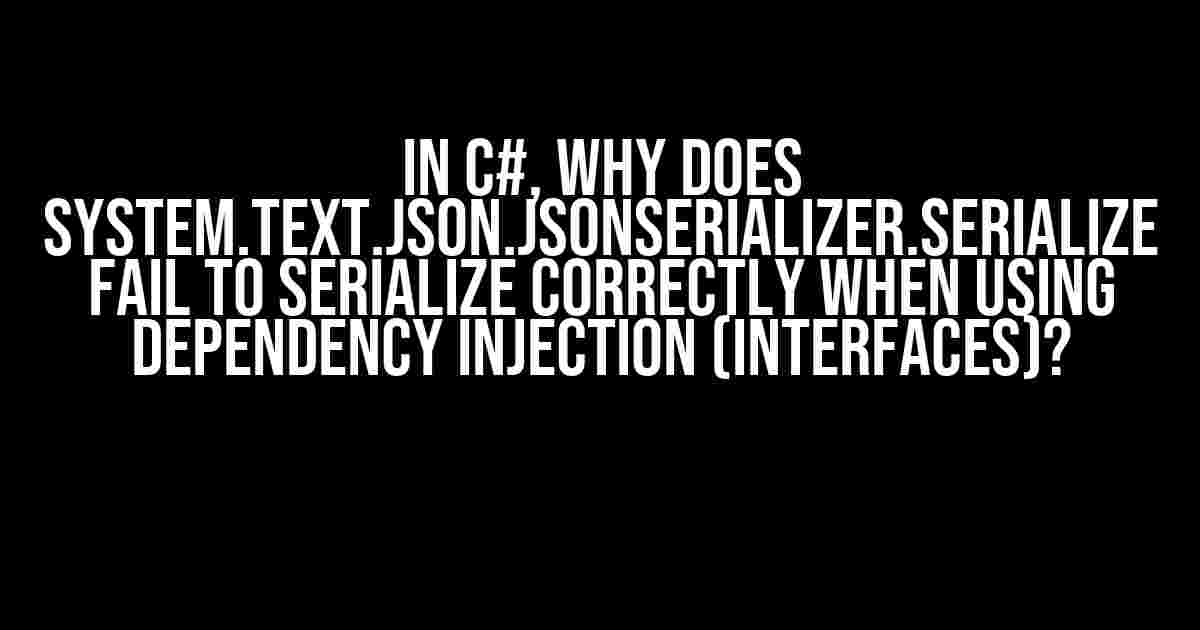Welcome to the world of .NET Core and C#, where serialization is a breeze… or so it seems. You’ve probably stumbled upon this article because you’ve encountered a rather frustrating issue:
What’s the Problem?
Lets set the stage: you have a beautiful C# application, neatly organized using dependency injection and interfaces. You’re trying to serialize an object that has a dependency on another class, which is injected through an interface. Sounds straightforward, right? Well, when you try to serialize this object using
public interface ILogger
{
void Log(string message);
}
public class MyLogger : ILogger
{
public void Log(string message)
{
Console.WriteLine($"Logged: {message}");
}
}
public class MyService
{
private readonly ILogger _logger;
public MyService(ILogger logger)
{
_logger = logger;
}
public void DoSomething()
{
_logger.Log("Doing something...");
}
}
public class Program
{
public static void Main()
{
var serviceProvider = new ServiceCollection()
.AddTransient()
.AddTransient()
.BuildServiceProvider();
var myService = serviceProvider.GetService();
var json = JsonSerializer.Serialize(myService); // BOOM!
}
}
The Root Cause: Lack of Concrete Type Information
The issue lies in the fact that when you use dependency injection with interfaces, the actual concrete type of the dependency is not easily accessible at runtime. The JsonSerializer needs concrete type information to serialize objects correctly. Without it, the serializer is lost, and you’re left with an error or a partially serialized object.
Solution 1: Use a Custom Converter
One way to solve this problem is by creating a custom converter that teaches the JsonSerializer how to handle interfaces and their concrete implementations. We’ll create a converter that resolves the concrete type from the dependency injection container.
public class InterfaceConverter : JsonConverterFactory
{
private readonly IServiceProvider _serviceProvider;
public InterfaceConverter(IServiceProvider serviceProvider)
{
_serviceProvider = serviceProvider;
}
public override bool CanConvert(Type typeToConvert)
{
return typeToConvert.IsInterface;
}
public override JsonConverter CreateConverter(Type typeToConvert, JsonSerializerOptions options)
{
var concreteType = _serviceProvider.GetService(typeToConvert);
return (JsonConverter)Activator.CreateInstance(typeof(ConcreteConverter<>).MakeGenericType(concreteType), options);
}
private class ConcreteConverter : JsonConverter
{
private readonly JsonSerializerOptions _options;
public ConcreteConverter(JsonSerializerOptions options)
{
_options = options;
}
public override T Read(ref Utf8JsonReader reader, Type typeToConvert, JsonSerializerOptions options)
{
// READ LOGIC GOES HERE
throw new NotImplementedException();
}
public override void Write(Utf8JsonWriter writer, T value, JsonSerializerOptions options)
{
JsonSerializer.Serialize(writer, value, value.GetType(), _options);
}
}
}
We’ll register this converter in our Startup.cs or wherever we configure our services:
public void ConfigureServices(IServiceCollection services)
{
services.AddControllers();
services.AddTransient();
services.AddJsonOptions(options =>
{
options.Converters.Add(new InterfaceConverter(services.BuildServiceProvider()));
});
}
Solution 2: Use a Third-Party Library
If you’re not comfortable with creating a custom converter or want a more straightforward solution, you can use a third-party library like Newtonsoft.Json. This library is more lenient when it comes to serializing objects with interfaces.
Install-Package Newtonsoft.Json
Then, in your Program.cs, use the Newtonsoft.Json serializer:
public static void Main()
{
var serviceProvider = new ServiceCollection()
.AddTransient()
.AddTransient()
.BuildServiceProvider();
var myService = serviceProvider.GetService();
var json = JsonConvert.SerializeObject(myService); // Voilà!
}
Solution 3: Avoid Interfaces in Serialization
If you have control over the design of your application, you can simply avoid using interfaces in serialization. Instead, use concrete types or abstract classes. This might require some refactoring, but it’s a viable solution.
public class MyLogger
{
public void Log(string message)
{
Console.WriteLine($"Logged: {message}");
}
}
public class MyService
{
private readonly MyLogger _logger;
public MyService(MyLogger logger)
{
_logger = logger;
}
public void DoSomething()
{
_logger.Log("Doing something...");
}
}
public class Program
{
public static void Main()
{
var serviceProvider = new ServiceCollection()
.AddTransient()
.AddTransient()
.BuildServiceProvider();
var myService = serviceProvider.GetService();
var json = JsonSerializer.Serialize(myService); // Easy peasy!
}
}
Conclusion
In this article, we’ve explored the reasons behind System.Text.Json.JsonSerializer.Serialize‘s failure to serialize objects correctly when using dependency injection with interfaces. We’ve presented three solutions to this problem: creating a custom converter, using a third-party library, and avoiding interfaces in serialization. Choose the approach that best fits your needs, and happy coding!
| Solution | Pros | Cons |
|---|---|---|
| Custom Converter | Flexibility, customizability | Complexity, requiresDI container |
| Third-Party Library | Ease of use, flexibility | Dependency on external library |
| Avoid Interfaces | Simplicity, no dependencies | Refactoring required, less flexibility |
Remember, when working with dependency injection and serialization, it’s essential to consider the trade-offs and choose the solution that best fits your project’s requirements.
FAQs
- Q: Can I use the built-in
System.Text.Jsonserializer with interfaces? - A: Unfortunately, no. The built-in serializer is not designed to handle interfaces out of the box.
- Q: Is the custom converter solution thread-safe?
- A: Yes, as long as your DI container is thread-safe, the custom converter will be too.
- Q: Can I use this solution with ASP.NET Core?
- A: Absolutely! This solution is compatible with ASP.NET Core and can be used in API controllers, services, or anywhere else you need to serialize objects.
Frequently Asked Question
Get ready to unravel the mystery of System.Text.Json.JsonSerializer.Serialize and its quirky behavior with dependency injection in C#!
Why does JsonSerializer.Serialize fail to serialize correctly when using dependency injection with interfaces?
The culprit behind this issue is the serialization of interfaces, which System.Text.Json doesn’t support out of the box. Since interfaces can’t be instantiated, the serializer gets confused and throws an exception. To fix this, you’ll need to use a concrete type or a surrogate class that implements the interface.
How can I configure JsonSerializer to work with interfaces and dependency injection?
One approach is to use the `JsonSerializerOptions` and specify a `Converters` collection with a custom converter that can handle interfaces. You can also use the `JsonSerializer` constructor to pass in the concrete type or a surrogate class that implements the interface. Alternatively, you can use a third-party library like Json.NET that has better support for interfaces.
Can I use attributes to decorate my interface implementations for serialization?
Yes, you can use attributes like `[JsonSerializable]` or `[JsonConverter]` to decorate your interface implementations and provide serialization hints to the JsonSerializer. However, keep in mind that this approach might not work with all types of interfaces and might require additional configuration.
Are there any performance implications when using custom converters or surrogates with JsonSerializer?
Yes, using custom converters or surrogates can have a performance impact, especially if you’re dealing with large datasets or complex objects. The JsonSerializer has to do extra work to convert the interface to a concrete type, which can affect serialization performance. However, the impact can be minimized by optimizing your converter or surrogate implementation and using caching mechanisms.
What are some best practices for using System.Text.Json with dependency injection and interfaces?
When using System.Text.Json with dependency injection and interfaces, it’s essential to follow best practices like registering concrete types or surrogates with the DI container, using attributes to provide serialization hints, and configuring JsonSerializerOptions carefully. Additionally, consider using libraries like Json.NET that provide better support for interfaces, and always test your serialization code thoroughly to avoid unexpected issues.


